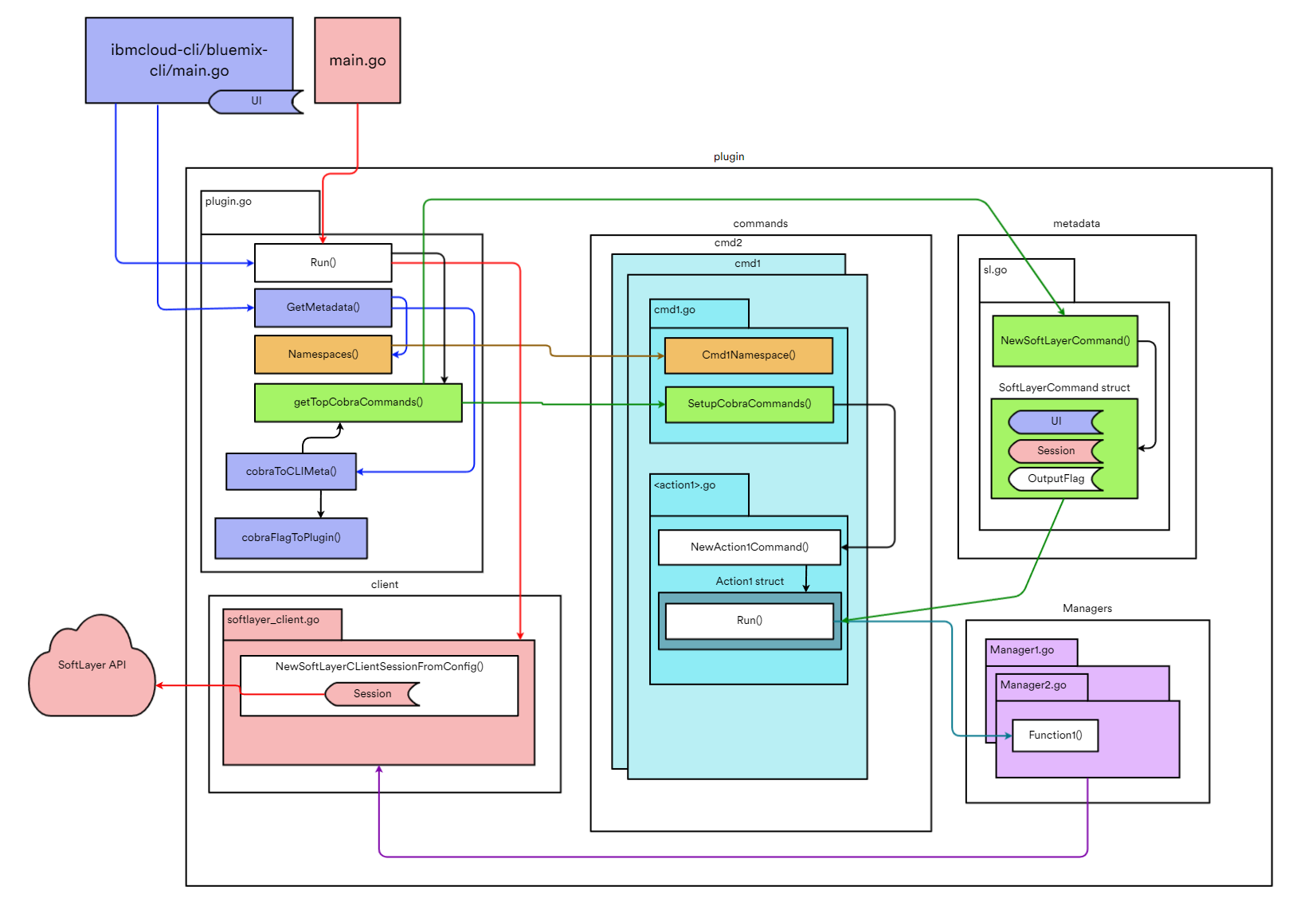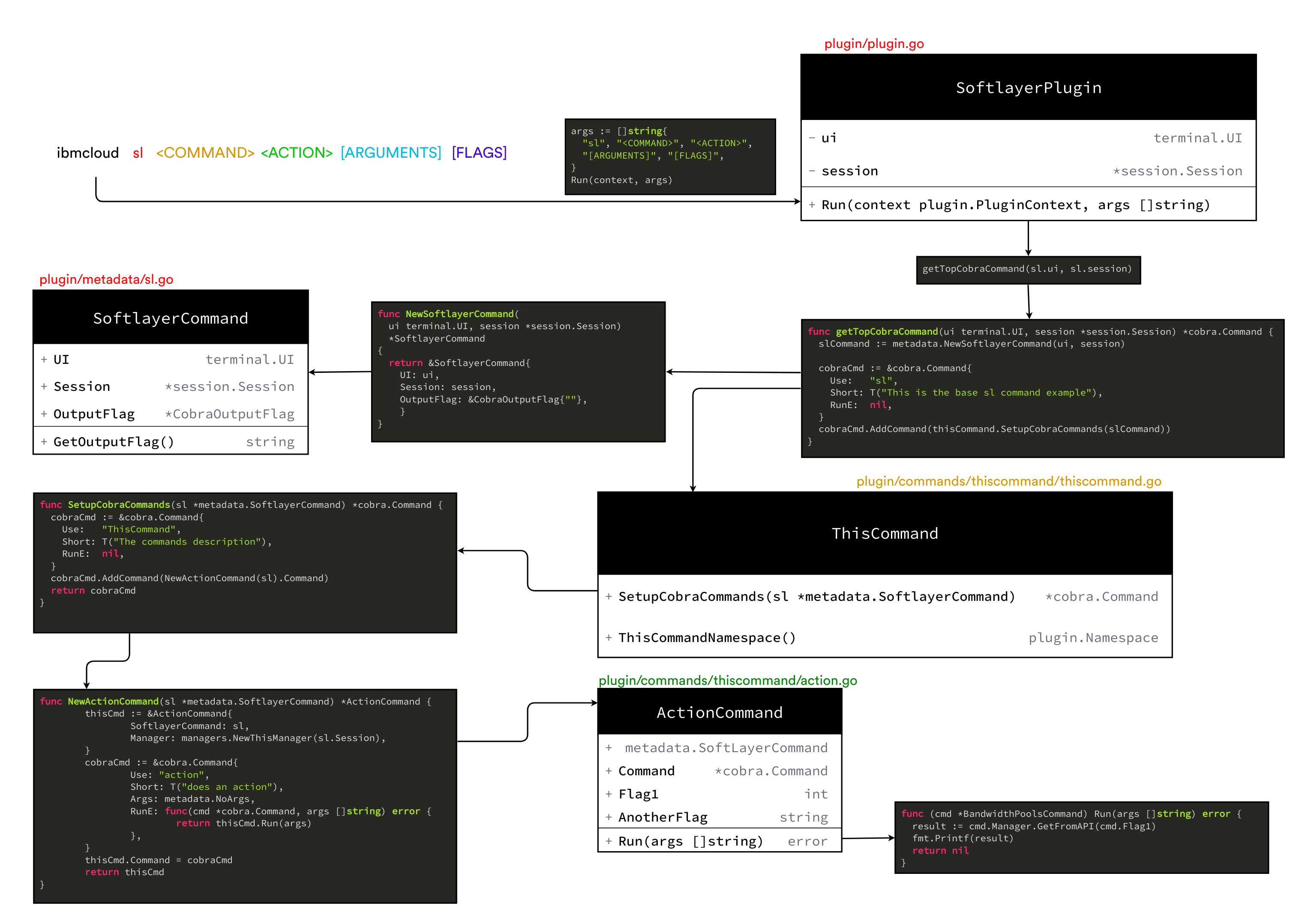This repository houses the code that powers the ibmcloud-cli sl command. CLI Documentation
The Classic Infrastructure commands are a plugin for the ibmcloud cli. First you need to Install the IBMCLOUD CLI. Then simply install the sl plugin with the following command:
ibmcloud plugin install slTo update, simply run
ibmcloud plugin update slTo install a version of the plugin built locally, you can do the following:
- Build the
slplugin binary go build- Install the new
softlayerbinary ibmcloud plugin install ./softlayer(might need to put./softlayer.exefor windows installs)
When building from source, the plugin gets its version information from plugin/metadata/sl.go. You may want to update that number to not get confused with official versions.
Clone the repo, then just run go mod vendor and go build and you should have a running binary for the sl plugin.
Before making a pull request, make sure everything looks good with these tools.
Working directory: $GO_PATH/src/github.ibm.com/SoftLayer/softlayer-cli
go vet $(go list ./... | grep -v "fixtures" | grep -v "vendor")
go test $(go list ./... | grep -v "fixtures" | grep -v "vendor")
This will test all the block commands, with verbose output
go test -v github.ibm.com/SoftLayer/softlayer-cli/plugin/commands/<command_group>
go test -v github.ibm.com/SoftLayer/softlayer-cli/plugin/managers
This will test only the block commands that have "Access Password" in their test name, and stop after 1 failure
go test -v github.ibm.com/SoftLayer/softlayer-cli/plugin/commands/block -ginkgo.failFast -ginkgo.focus "Access Password"
This will generate a code coverage report for all the file commands
$> go test -coverprofile=coverage.out github.ibm.com/SoftLayer/softlayer-cli/plugin/commands/file
ok github.ibm.com/SoftLayer/softlayer-cli/plugin/commands/file 1.225s
Coverage report
For basic information
go tool cover -func=coverage.out
Detailed HTML output
go tool cover -html=coverage.out
Specific Tests
go test -v -coverprofile=coverage.out github.ibm.com/SoftLayer/softlayer-cli/plugin/managers -ginkgo.focus Issues3190
To force API errors, or api results that you don't want to put in a fixture, you need to get the testhelper transport handler, something like this.
var (
fakeSLSession *session.Session
fakeHandler *testhelpers.FakeTransportHandler
// Other fake managers/CLI things go here
)
BeforeEach(func() {
fakeSLSession = testhelpers.NewFakeSoftlayerSession(nil)
fakeHandler = testhelpers.GetSessionHandler(fakeSLSession)
// Other fake managers/CLI things go here
})
AfterEach(func() {
fakeHandler.ClearApiCallLogs()
fakeHandler.ClearErrors()
})fakeSLSession will get used anytime something requres a softlayer-go session.
fakeHandler is responsible for "faking" the API requests. By default it does this by looking up the appropriate JSON file in testfixtures/<SERVICE>/<METHOD>.json. It is also possible to specify specific IDs by using this format: testfixtures/<SERVICE>/<METHOD>-<ID>.json which if you call SoftLayer_Hardware/getObject(id=1234) it will load testfixtures/SoftLayer_Hardware/GetObject-1234.json
If you want to force an API error, do something like the following.
(From managers/hardware_tests.go)
// Add the API error to the handler
fakeHandler.AddApiError("SoftLayer_Hardware_Server", "toggleManagementInterface", 500, "IPMI ERROR")
// Make the API call
err := hardwareManager.ToggleIPMI(123456, false)
// Make sure the error happened
Expect(err).To(HaveOccurred())
// Check the error message is as expected. The format will be similar to this
Expect(err.Error()).To(Equal("IPMI ERROR: IPMI ERROR (HTTP 500)"))(from managers/hardware_test.go)
If you want to make sure an API call was properly formatted and made, do the following
// Make the API call
hws, err := hardwareManager.ListHardware(...args)
// Normal Checks...
Expect(err).NotTo(HaveOccurred())
Expect(len(hws)).To(Equal(2))
// Get the apiCalls from the fakeHandler
apiCalls := fakeHandler.ApiCallLogs
// Make sure there was the right number of calls
Expect(len(apiCalls)).To(Equal(1))
// Check the service is correct
Expect(apiCalls[0].Service).To(Equal("SoftLayer_Account"))
// get the slOptions
slOptions := apiCalls[0].Options
// Check to make sure all object filters get set properly.
Expect(slOptions.Filter).To(ContainSubstring(`"id":{"operation":"orderBy","options":[{"name":"sort","value":["DESC"]}]}`))Check testhelpers/fake_softlayer_session.go for all the fields that get recorded with an API call.
CLI calls to manager functions need an entry in plugin\testhelpers\fake_manager.go
Managers have a fake/test interface that is autogenerate with a program called couterfieter
go generate ./...
each manager and defined interface should have this line in it to be automatically generated. After the imports, before any interfaces
//counterfeiter:generate -o ../testhelpers/ . <Whatever>Manager
If you want to use the real manager but fixture API data, just initialize the manager like this in the CLI test
(filenames here is optional of course)
BeforeEach(func() {
filenames := []string{"getDatacenters_1",}
fakeSLSession = testhelpers.NewFakeSoftlayerSession(filenames)
OrderManager = managers.NewOrderManager(fakeSLSession)
fakeUI = terminal.NewFakeUI()
cmd = order.NewPlaceCommand(fakeUI, OrderManager, nil)
cliCommand = cli.Command{
Name: metadata.OrderPlaceMetaData().Name,
Description: metadata.OrderPlaceMetaData().Description,
Usage: metadata.OrderPlaceMetaData().Usage,
Flags: metadata.OrderPlaceMetaData().Flags,
Action: cmd.Run,
}
})New commands needs a command_test.go file in the CLI directory.
If you added slplugin/commands/new/ then there needs to be a slplugin/commands/new/new_test.go file. Copy the content from one of the other command test files and just change the name and package.
In unit tests, you will want to establish a FakeSoftLayerSession object so that API requests faked from test fixtures.
Something like this.
BeforeEach(func() {
fakeSLSession = testhelpers.NewFakeSoftlayerSession(nil)
networkManager = managers.NewNetworkManager(fakeSLSession)
})By default, every API call made to the SoftLayer API will load in the appropraite JSON file from testfixtures/SoftLayer_Service/method.json
To force errors:
// In the Top level BeforeEach
fakeSession = testhelpers.NewFakeSoftlayerSession(nil)
fakeHandler = testhelpers.GetSessionHandler(fakeSession)
// Then in a BeforeEach for the specific test...
BeforeEach(func() {
fakeHandler.AddApiError("SoftLayer_User_Customer", "getObject",
500, "Internal Server Error")
})To force a non-default JSON file to be loaded
This will load testfixtures/SoftLayer_Network_Vlan/getObject-noBilling.json when SoftLayer_Network_Vlan::getObject is called next.
fakeSLSession = testhelpers.NewFakeSoftlayerSession([]string{"getObject-noBilling.json"})
networkManager = managers.NewNetworkManager(fakeSLSession)Fixutres can also be loaded by ID automatically with the format testfixtures/SoftLayer_Service/getObject-1234.json where 1234 is the ID you passed into the API call.
Terminology:
ibmcloud sl <COMMAND> <ACTION>COMMAND: is a collection of actions here. ACTION: What part of the command you are running.
-
Add an entry to
plugin/plugin.goin thegetTopCobraCommand()function that follows this patterncobraCmd.AddCommand(newcommand.SetupCobraCommands(slCommand)) -
Create a new folder
plugin/commands/newcommand/ -
Create a new file
plugin/commands/newcommand/newcommand.goWhich will look like this:
package newcommand
import (
"github.com/spf13/cobra"
"github.com/IBM-Cloud/ibm-cloud-cli-sdk/plugin"
. "github.ibm.com/SoftLayer/softlayer-cli/plugin/i18n"
"github.ibm.com/SoftLayer/softlayer-cli/plugin/metadata"
)
func SetupCobraCommands(sl *metadata.SoftlayerCommand) *cobra.Command {
cobraCmd := &cobra.Command{
Use: "newcommand",
Short: T("A description of the new command"),
RunE: nil,
}
cobraCmd.AddCommand(NewSomeNewCommand(sl).Command)
return cobraCmd
}
func AccountNamespace() plugin.Namespace {
return plugin.Namespace{
ParentName: "sl",
Name: "newcommand",
Description: T("A description of the new command"),
}
}for tests, copy from one of the other command main test functions. Make sure to add any actions to the actions list.
- Create a new files
plugin/commands/the_command/action.go - It should have its own type
type ActionNameCommand struct {
*metadata.SoftlayerCommand
Command *cobra.Command
Manager managers.SomeManager
// Flags go here as well
}- It should have a function to create an instance of the type called
NewActionNameCommand
func NewActionNameCommand(sl *metadata.SoftlayerCommand) *ActionNameCommand {
thisCmd := &ActionNameCommand{
SoftlayerCommand: sl,
Manager: managers.NewSomeManager(sl.Session),
}
cobraCmd := &cobra.Command{
Use: "command-name",
Short: T("A description of the command"),
Long: T(`This is an optional field, you can remove it if the command is simple.
Otherwise create a nice long description of how to use this command. Its good to add some examples.
EXAMPLE:
${COMMAND_NAME} sl newcommand command-name --someFlag test --soomethingElse
This sets a flag and does something else.`)
Args: metadata.NoArgs,
RunE: func(cmd *cobra.Command, args []string) error {
return thisCmd.Run(args)
},
}
thisCmd.Command = cobraCmd
return thisCmd
}- It should have a
Run()function
func (cmd *BandwidthPoolsCommand) Run(args []string) error {
// do some stuff
return nil
}- Add the function to
command.goin theSetupCobraCommandfunction
cobraCmd.AddCommand(NewActionNameCommand(sl).Command)anything with T("some string here") uses the internationalization system. Specifically we use the goi18n/v2 library for most work here.
Currently we use a custom version of goi18n which can parse T() functions like we use (an artiface of migrating from v1 to v2). The custom binary (bin/goi18n2*) has some code that forces the .json file it generates to be like the following, because otherwise the translations don't get loaded properly.
{
"words you want translated" : {
"other": "words you want translated"
}
}The changes are this for future reference:
~/go/src/github.com/allmightyspiff/go-i18n (Tfunctions)
$> git diff goi18n/marshal.go
diff --git a/goi18n/marshal.go b/goi18n/marshal.go
index a6cc762..a256f2b 100644
--- a/goi18n/marshal.go
+++ b/goi18n/marshal.go
@@ -28,7 +28,9 @@ func marshalValue(messageTemplates map[string]*i18n.MessageTemplate, sourceLangu
for id, template := range messageTemplates {
if other := template.PluralTemplates[plural.Other]; sourceLanguage && len(template.PluralTemplates) == 1 &&
other != nil && template.Description == "" && template.LeftDelim == "" && template.RightDelim == "" {
- v[id] = other.Src
+ m := map[string]string{}
+ m["other"] = other.Src
+ v[id] = m
} else {
m := map[string]string{}
if template.Description != "" {
To generate the en-US.json file, just run
python bin/buildAndDeploy.py i18nThe plugin/i18n/v2Resources/active.*.json files are all compiled into the binary automatically.
Where possible, you should try to minimize the number of unique strings we need to translate. To do this, make use of substitutions. For example:
BAD:
T("This is some output for a file command")
T("This is some output for a block command")GOOD:
subs := map[string]interface{}{"CMDTYPE": "block"}
T("This is some output for a {{.CMDTYPE}} command", subs)NOTICE goi18n/v2 has some newer features that can make this a bit easier to deal with, but I'm not sure they are currently supported, so procede with caution in you make use of them.
Should in general take care of all these steps for you. The binaries for win/mac/linux should be in the repo.
$> python bin/buildAndDeploy.py i18n
Running: C:\Users\allmi\go\src\github.ibm.com\softlayer\softlayer-cli\bin\i18n4go.exe -c=checkup -q=i18n -v -d=C:\Users\allmi\go\src\github.ibm.com\softlayer\softlayer-cli\plugin
No Changes Needed!
Building I18N: ./bin/go-bindata.exe -pkg=resources -o=plugin/resources/i18n_resources.go plugin/i18n/resources
OK!
Vendor files are now managed by go mod vendor, I had to set these environment variables to download github.ibm.com vendor objects. To update the github.com/softlayer/softlayer-go dependancy, update go.mod file.
https://golang.org/doc/faq#git_https
export GOPROXY=direct
export GOPRIVATE=github.ibm.com/*
# Make sure you gitconfig has these lines
cat ~/.gitconfig
[url "ssh:https://[email protected]/"]
insteadOf = https://github.ibm.com/
go mod vendor
If you get this error, check your GOPROXY and GOPRIVATE settings.
$ go mod vendor
go: github.ibm.com/Bluemix/[email protected]: verifying go.mod: github.ibm.com/Bluemix/[email protected]/go.mod: reading https://sum.golang.org/lookup/github.ibm.com/!bluemix/[email protected]: 410 Gone
server response:
not found: github.ibm.com/Bluemix/[email protected]: invalid version: git fetch -f origin refs/heads/*:refs/heads/* refs/tags/*:refs/tags/* in /tmp/gopath/pkg/mod/cache/vcs/7c3b4597f53c7708d8d63068430570d5325f6ceef4fb0e2076cc6c593df4c01a: exit status 128:
fatal: could not read Username for 'https://github.ibm.com': terminal prompts disabled
ALSO:
To make changes to the cli documentation, do so here: https://github.ibm.com/cloud-docs/cli/tree/draft/reference/ibmcloud
Here are a list of common problems and what the code should look like if you need to solve them.
id, err := strconv.Atoi(args[0])
if err != nil {
return slErrors.NewInvalidSoftlayerIdInputError(T("IDENTIFIER"))
}It("return error", func() {
fakeUserManager.GetUserReturnsOnCall(0, testUser, nil)
fakeUserManager.GetUserReturnsOnCall(1, datatypes.User_Customer{}, errors.New("BAD HARDWARE"))
err := testhelpers.RunCobraCommand(cliCommand.Command, "5555", "--hardware")
Expect(err).To(HaveOccurred())
Expect(err.Error()).To(ContainSubstring("Failed to show hardware."))
})After v1.4.1 sl will be a normal plugin, so where are the instructions to build the plugin.
Use the ./bin/buildAndDeploy.py script to do a release:
$> python bin/buildAndDeploy.py
Usage: buildAndDeploy.py [OPTIONS] COMMAND [ARGS]...
Options:
--help Show this message and exit.
Commands:
build Builds the SL binaries
deploy Deploys the SL binaries
i18n Checks and builds the i18n files
jenkins Trigger a Jenkins build with existing files.
release Builds, then deploys the release
test Runs the tests
./bin/buildAndDeploy.py test: Runs all the tests, required to pass./bin/buildAndDeploy.py i18n: Fixing missing i18n problems, builds the i18n gobindata./bin/buildAndDeploy.py build: Generates binaries for all architectures in./out./bin/buildAndDeploy.py deploy: Uploads binaries to our object storage account softlayer-cli-binaries:./bin/buildAndDeploy.py release: Spins up the Jenkins job to publish a release- Test then manually promote from staging to production to actually release the plugin. Pomotion Jenkins
ENV Variables that need to be set:
JENKINS_TOKEN: Auth token to run Jenkins. Username is hardcoded for me at the moment.IBMCLOUD_APIKEY: API key for usingibmcloud. This is how we upload to COS. The COS plugin needs to be installed as well.ibmcloud plugin install cloud-object-storage
/docs/docs is a command that will generate markdown documentation. This documentation needs to be copied and updated in the https://github.ibm.com/cloud-docs/cli repo (draft branch).
To build the full docs locally, see https://test.cloud.ibm.com/docs-internal/writing?topic=writing-transform-local
➜ md-source pwd
/Users/chris/Code/md-source
➜ md-source ls -lh
total 0
drwxr-xr-x 3 chris staff 96B Nov 30 12:58 build
drwxr-xr-x 3 chris staff 96B Nov 30 13:01 input
drwxr-xr-x 4 chris staff 128B Nov 30 13:01 output
➜ marked-it-cli input --output=output --footer-file=build/markdown/footer.txt --extension-file=build/markdown/headerFooterExt.js --extension-file=build/markdown/generateSectionsExt.js --extension-file=build/markdown/accessibilityExt.js --extension-file=build/markdown/jsonTocExt.js --keyref-file=build/markdown/cloudoekeyrefs.yml --overwrite --verbose --toc-json --extension-file=build/markdown/videoExt.js --extension-file=build/markdown/terraformExt.js --extension-file=build/markdown/includesExt.js --extension-file=build/markdown/glossaryExt.js --@glossary:definitions-file=/Users/chris/Code/md-source/build/markdown/glossary.jsonAutomate build with https://github.ibm.com/coligo/cli/tree/main/script
Make sure to add the pre-commit hook by running pre-commit install
To run a scan do:
detect-secrets scan --update .secrets.baselineIf we need to update the excluded files (these are saved in the .secrets.baseline file) do this:
detect-secrets -v scan --update .secrets.baseline --exclude-files "plugin/i18n/v1Resources/|plugin/i18n/v2Resources/|(.*test.*)|(vendor)|(go.sum)|bin/"
